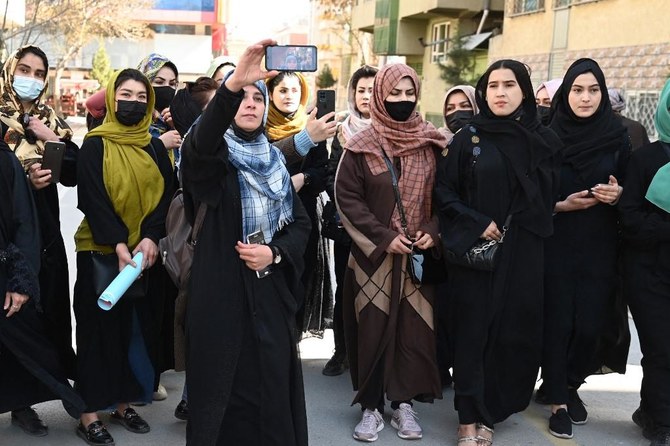Afghan women and girls flock online to evade Taliban curbs on female education
Digital platforms say tens of thousands have enrolled for internet classes since imposition of restrictions

Kabul: Tens of thousands of Afghan women and girls have been able to join online study programmes despite the Taliban government’s ban on female education, according to internet-based course providers.
The providers say they have seen strong demand from Afghanistan for courses on subjects including English language, science and business since the Taliban extended their ban on female attendance at schools to include higher education in December 2022.
The Taliban say the restrictions are justified by their conservative interpretation of Islamic law. Unicef, the UN children’s fund, estimates the ban has affected more than 1mn girls.
But online learning has surged as a way to get around the curbs, despite the dangers of discovery and difficulties with internet connectivity and power supplies.
Access to the internet remains low and uneven across Afghanistan. A Gallup survey in 2022 found 25 per cent of men reported having access compared with 6 per cent of women. In rural areas, just 2 per cent of women said they had internet access.
UK-based online learning platform FutureLearn said it had enrolled over 33,000 Afghan students, the vast majority of them female, since it offered free access to its premium digital learning platform a year ago for the duration of the Taliban female education ban.
FutureLearn, which was launched by the Open University in the UK in 2012 and has been owned by Global University Systems since December 2022, offers over 1,200 courses, with English language accounting for four of the five most popular classes among Afghan students.
University of the People, a US-accredited non-profit higher education institution, said that more than 21,000 Afghan women had applied in the past year for its degree courses, with over 3,100 currently enrolled to study subjects including business, computer science, health and education.
UoPeople said power cuts and erratic digital connections were major issues for Afghan women and that it provided asynchronous sessions and online textbooks to allow students to catch up as well as scholarships to cover their costs.
Since the Taliban regained power in 2021 after a 20-year insurgency, they have set about creating one of the world’s most repressive regimes for women.
Despite initially saying there would be no blanket ban on girls’ education, the country’s rulers have systematically imposed tight restrictions on women’s right to study, work and travel.
Human rights group Amnesty International has documented how women and girls found violating Taliban restrictions on gender freedoms have been punished with arbitrary arrest, detention and even corporal punishment. The Taliban have detained campaigners for girls’ education, including activist Matiullah Wesa, who was released in October after seven months in prison.
“To protect their safety, UoPeople asks our Afghan female students to study behind closed doors so they are not detected by the Taliban,” said Daniel Kalmanson, the online university’s vice-president for public affairs. “In addition, we allow them to use a fake identity in their classes.”
Kalmanson added that while women were the focus of the Taliban’s restrictions on women’s involvement in education, the curbs were “also impacting Afghan boys since there are not enough male teachers left to educate all of the male children”.
The Taliban, who banned girls’ education when they first ruled Afghanistan in the 1990s, have given various reasons for their current restrictions, including concerns about the curriculum and uniforms.
However, members of the group say the decision to impose sweeping curbs on women’s rights represents the triumph of its most hardline faction, led by elusive supreme leader Hibatullah Akhundzada.
The ban on girls’ education has helped turned the Taliban into international pariahs and has been condemned by Islamic scholars around the world.
No government has recognised their regime and many international donors have cut ties with the country, depriving it of vital humanitarian aid.
Despite the ban, some community and underground schools have continued to educate women in Afghanistan.
Maaz Arabi of the UK-based Sabar Afghan Online School said the YouTube channel of video classes it launched in February 2022 had been viewed 200,000 times, with the most popular courses being in science and English. “We continuously receive feedback messages from parents and students [on] how our YouTube channel is helping them,” he said.




